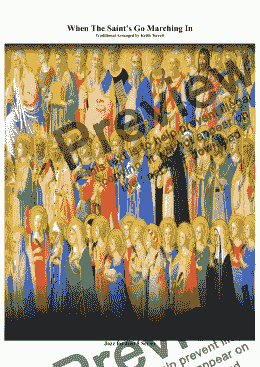Ready to print
You have already purchased this music, but not yet printed it.
This page is just a preview and does not allow printing. To print your purchase, go to the My purchases page in your account and click the relevant print icon.
When the Saint's Go Marching In for Flexible Band (Grade 2/3 ish)

Already purchased!
You have already purchased this score. To download and print the PDF file of this score, click the 'Print' button above the score. The purchases page in your account also shows your items available to print.
This score is free!
Buy this score and parts
When the Saint's Go Marching In for Flexible Band (Grade 2/3 ish)
$51.99
$12.99
from $1.50
Preview individual parts:
Instant download
You are purchasing high quality sheet music PDF files suitable for printing or viewing on digital devices.A flexible band arrangement of ''When the Saints Go Marching In''.
"When the Saints Go Marching In", often referred to as "The Saints", is a Black spiritual. Though it originated as a Christian hymn, it is often played by jazz bands. This song was famously recorded on May 13, 1938, by Louis Armstrong and his orchestra. The song is sometimes confused with a similarly titled composition "When the Saints Are Marching In" from 1896 by Katharine Purvis (lyrics) and James Milton Black (music).
The origins of this song are unclear. It apparently evolved in the early 1900s from a number of similarly titled gospel songs, including "When the Saints Are Marching In" (1896) and "When the Saints March In for Crowning" (1908).[3] The first known recorded version was in 1923 by the Paramount Jubilee Singers on Paramount 12073. Although the title given on the label is "When All the Saints Come Marching In", the group sings the modern lyrics beginning with "When the saints go marching in". No author is shown on the label. Several other gospel versions were recorded in the 1920s, with slightly varying titles but using the same lyrics, including versions by The Four Harmony Kings (1924), Elkins-Payne Jubilee Singers (1924), Wheat Street Female Quartet (1925), Bo Weavil Jackson (1926), Deaconess Alexander (1926), Rev. E. D. Campbell (1927), Robert Hicks (AKA Barbecue Bob, 1927), Blind Willie Davis (1928), and the Pace Jubilee Singers (1928).
The earliest versions were slow and stately, but as time passed the recordings became more rhythmic, including a distinctly uptempo version by the Sanctified Singers on British Parlophone in 1931. Even though the song had folk roots, a number of composers claimed copyright in it in later years, including Luther G. Presley and Virgil Oliver Stamps, R. E. Winsett. The tune is particularly associated with the city of New Orleans. A jazz standard, it has been recorded by a great many jazz and pop artists.
The beauty of this series is the fact that the chart will work with just 5 players, if you distribute parts 1 to 5 evenly.
In addition, my super ''Jazz for 5'' series has parts for beginners for all instruments.
There is a drum kit part, plus if you have more percussionists than you can cope with; there are battery parts for snare drum, cymbals & bass drum!
The Timpani part is optional.
There are other titles in this series such as:
Moonlight Serenade, Amazing Grace, That's a Plenty, Little Brown Jug, Frankie & Johnny & Battle Hymn of the Republic.



